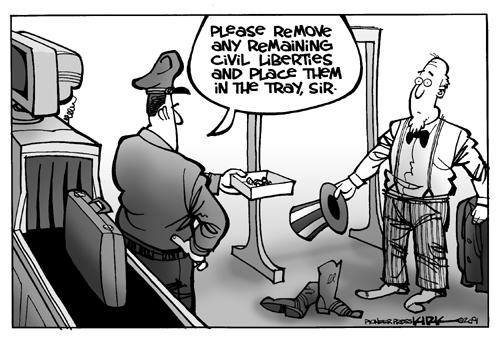
http://www.umich.edu/~moment/current/3.htm
In January 1st, the Brazilian government began photographing and fingerprinting all United States citizens who enter the country. This is Brazil's response to similar measures in the U.S. that now require the photographing and fingerprinting of all visitors to the U.S. except those from 27 mostly European countries. Though Rio de Janeiro city officials have sharply criticized the new rules as detrimental to tourism, the federal government has stood by the new measures. On January 12th, Brazil's President, Luiz Inacio "Lula" da Silva asked President Bush to drop the American requirements, suggesting that Brazil would do the same. Lula stated: "If the problem is to fight terrorism, this measure makes no sense. We have no culture of terrorism (in Brazil)." In response to Lula's appeal, however, The Bush administration has not changed its procedures.
Although Brazil's decision to deal with U.S. visitors in this manner may at first seem insignificant, this is an important symbolic statement that affirms Brazilian self-respect and independence in the face of U.S. arrogance and will to Empire. Many Americans assume that the U.S. has a superior authority to claim whatever corner of the world it desires, and the right to intervene wherever it sees fit. Common also is the belief that Americans are a privileged class of people who have a right to travel the world unbothered, while our own government can deal with visitors however it sees fit.
One example of this is an American Airlines pilot named Dale Robin Hirsh who, when asked to be photographed and fingerprinted under Brazil's reciprocal policy, flicked off the camera and with eleven other members of his crew derided the Brazilian authorities. In response, Brazil jailed and fined Hirsh almost $13,000, while the rest of the crew was denied entry into the country.
Imperialist ideology over centuries has been built upon the belief that foreign societies or nations of people are legitimate targets for exploitation. As Edward Said discussed in Orientalism, European interactions with countries to the East of Europe were governed by the belief that these cultures were inherently inferior and ripe for European dominance. Such attitudes have likewise long dominated U.S. discourse and behavior toward Latin American countries. In Brazil, the CIA deposed the popularly elected left wing leader Jo�o Goulart in 1964, after which Brazil was subjected to a string of right wing military regimes supported by the United States. Intervention after bloody intervention, from the overthrow of Allende to the funding of the mercenary Contras in Nicaragua, has been carried out under the guise of promoting democracy and the noble, superior values and institutions of the U.S. version of American civilization.
In demanding that U.S. travelers be subjected to the same security procedures in traveling to Brazil as Brazilians are being forced to endure when traveling to the United States, Brazil is asserting that it is not a colony freely open to penetration and exploitation by the United States, but a sovereign nation with its own institutions and laws. It is a small part of the struggle to give expression to the national consciousness and defiance required to stand up to the force of global dominance by corporate elites and U.S. imperial power, which have helped to produce the crippling poverty that plagues Brazil. It may be hoped that Brazil's new policy will send U.S. citizens the message that the rest of the world is not our playground, and that if we wish to be treated with respect and trust from foreign governments when traveling, we must insist that our own government treat visitors to the U.S. in kind.
James Leaf is a Senior at Community High School. He is interested in alternative education.
